- Mar 29, 2017 13H:53 GMT/UTC/ZULU TIME
- UK Politics
- 420
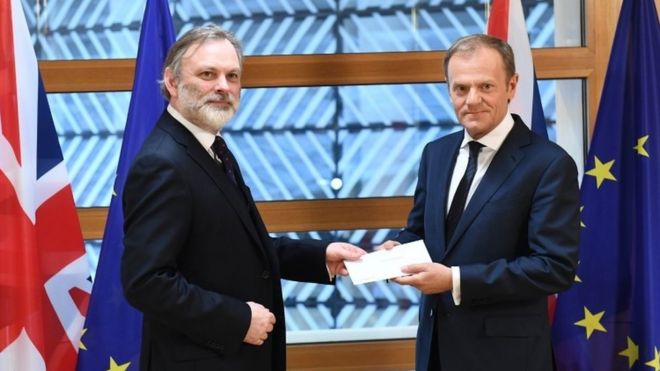 EUROPEAN PHOTOPRESS
EUROPEAN PHOTOPRESS
Britain's departure from the European Union is an "historic moment from which there can be no turning back", Theresa May has told MPs.
The prime minister said it was a "unique opportunity" to "shape a brighter future" for the UK.
She was speaking after Britain's EU ambassador formally triggered the two year count down to the UK's exit by handing over a letter in Brussels.
It follows June's referendum which resulted in a vote to leave the EU.
- Live: Rolling text and video updates
- Article 50: What happens now?
- BBC Editors: The key issues for negotiation
- All you need to know about Brexit
In a statement in the Commons, the prime minister said: "Today the government acts on the democratic will of the British people and it acts too on the clear and convincing position of this House."
She added: "The Article 50 process is now under way and in accordance with the wishes of the British people the United Kingdom is leaving the European Union.
"This is an historic moment from which there can be no turning back."
She said Britain would now make its own decisions and its own laws and "take control of the things that matter most to us - and we are going to take this opportunity to build a stronger, fairer Britain, a country that our children and grandchildren are proud to call home".
She told MPs that this marks "the moment for the country to come together".
Mrs May promised to "represent every person in the whole United Kingdom" during the negotiations - including EU nationals, whose status after Brexit has yet to be settled.
"It is my fierce determination to get the right deal for every single person in this country," she said.
"For, as we face the opportunities ahead of us on this momentous journey, our shared values, interests and ambitions can - and must - bring us together."
The six page letter from Mrs May triggering Article 50 of the Lisbon Treaty was handed over to EU Council President Donald Tusk by the UK's ambassador to the EU Sir Tim Barrow.
It called for a "deep and special" partnership in the best interests of both the UK and the EU - but said the UK wanted to agree a trade deal alongside a withdrawal deal within the two year time table allowed by Article 50 of the Lisbon Treaty.
In a brief statement, Donald Tusk said the EU's aim in negotiations was "damage limitation" and to "minimise costs" for EU citizens, businesses and member states.
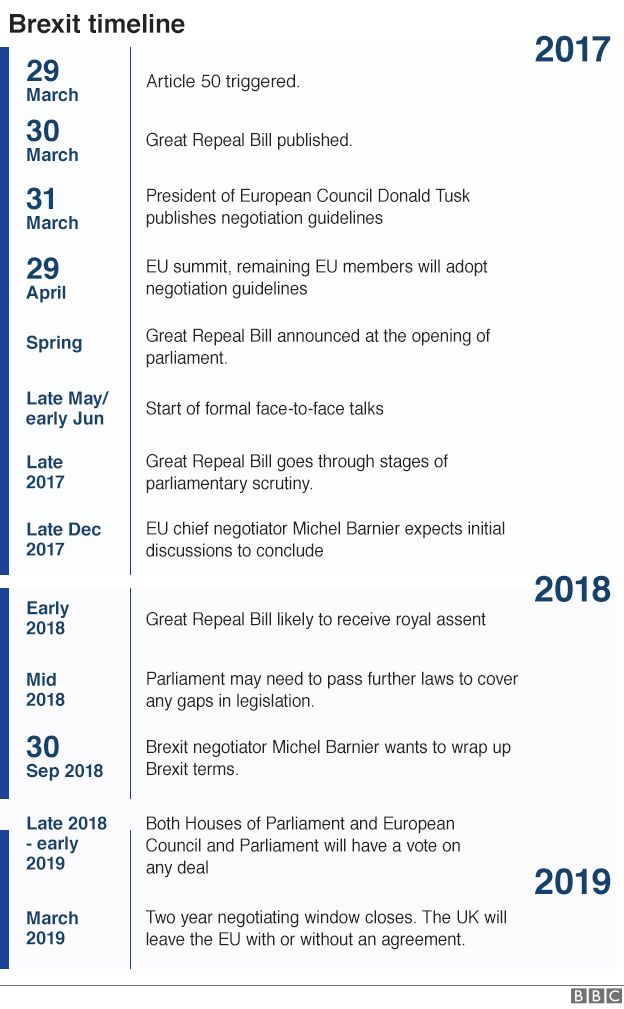
Labour leader Jeremy Corbyn said his party respected the decision to leave the EU and would hold the government to account "every step of the way".
He said: "Britain is going to change as a result. The question is how."
Mr Corbyn warned it would be "a national failure of historic proportions" if Mrs May does not secure protection for workers' rights.
The Liberal Democrats, who oppose Brexit, said Mrs May was "pulling the trigger that will set in motion a chain of events which will change this country forever, and doing so without a proper plan".
Chancellor Philip Hammond, who like Mrs May and Mr Corbyn campaigned against Brexit in the referendum, said the triggering of Article 50 was "a pivotal moment for Britain".
He told BBC Radio 4's Today programme the country would continue to remain a full member of the EU for the next two years and would observe "the same rules and obligations".
He also stressed that there will be no cut-off from today to the rights of EU nationals arriving in Britain.
The European Parliament had threatened to veto any agreement if the UK ended those rights from today.
Mr Hammond also played down the prospect of Britain leaving the EU without any deal, insisting "we will get a deal".
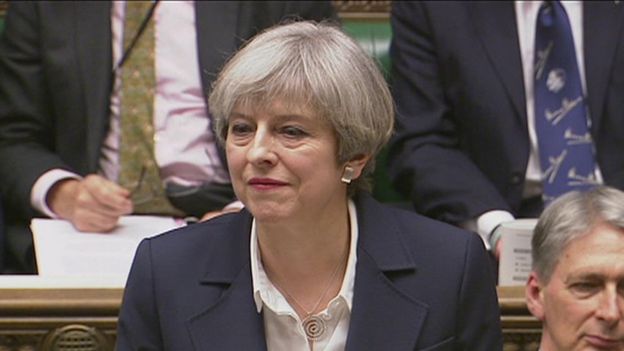 BBC NEWS
BBC NEWS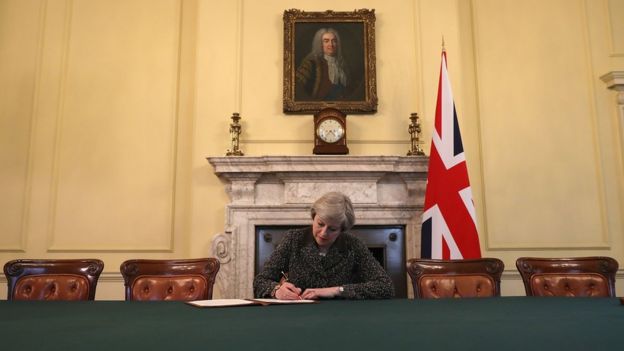 PA
PA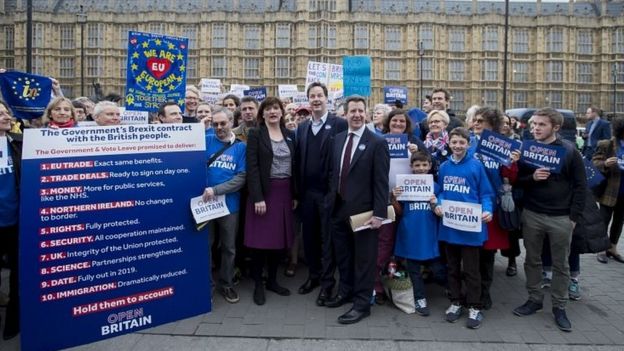 PA
PA
And in what appeared a rebuff to the Foreign Secretary Boris Johnson he suggested the UK would have to compromise with other EU countries and could not expect to secure all its demands.
"We cannot have our cake and eat it," he said.
He did not rule out partial or associate membership of the EU single market, while stressing that the UK could not remain "full members" of it.
In a draft resolution, the European Parliament said any trade deal between the UK and the EU can only be struck after Britain has left.
The document says any transitional agreement to tide over the period before a trade deal is put in place should last no more than three years after the expected date of Brexit in 2019.
The resolution, expected to be debated and adopted by the European Parliament in Strasbourg on April 5, sets out the tough line which leading MEPs want the EU's chief negotiator Michel Barnier to take in negotiations triggered by the invocation of Article 50.
Describing Brexit as an "unprecedented and regrettable event", it calls for the process to be arranged "in an orderly fashion so as not to negatively affect the European Union, its citizens and the process of European integration".
Theresa May will be outlining the next steps during a special half hour BBC One interview on Wednesday with Andrew Neil at 19:00 BST on "Britain after Brexit", to mark the triggering of Article 50.
Up for discussion
- Trade: The UK will withdraw from the single market and seek a new customs arrangement and a free trade agreement with the EU
- Expats: The government wants to secure an agreement with European countries "at the earliest opportunity" on the rights of EU nationals in the UK and Britons living in Europe
- Brexit bill: The UK government has promised to honour its obligations as it leaves, but has brushed off claims these could run to £50bn
- Northern Ireland border: Aiming for "as seamless and frictionless a border as possible between Northern Ireland and Ireland"
- Sovereignty: Britain will leave the jurisdiction of the European Court of Justice but seek to set up separate resolution mechanisms for things like trade disputes
- Security: The UK government has said it wants to continue to cooperate on security and intelligence-sharing
- Transitional deal: An interim arrangement may be needed before the final arrangements come into force
On Tuesday night, Mrs May spoke by telephone to Mr Tusk, EU Commission president Jean-Claude Juncker and German Chancellor Angela Merkel.
Article 50 gives both sides two years to reach agreement, so unless both sides agree to extend the deadline for talks, the UK will leave on 29 March 2019.
Negotiations are expected to begin in mid-May. The UK government says it wants to carry out both separation and trade talks at the same time, but EU chiefs say the two issues must be handled separately.
The UK has said it wants an "early agreement" to guarantee the rights of EU citizens living in the UK and those of British nationals living abroad.
Other issues which are likely to be discussed are cross-border security arrangements, the European Arrest Warrant, moving EU agencies which have their headquarters in the UK and the UK's contribution to pensions of EU civil servants - part of a wider "divorce bill" which some reports have suggested could run to £50bn.
On Thursday the government is expected to publish details of its "Great Repeal Bill", which aims to convert EU law into domestic legislation and repeal the European Communities Act, which says EU law is supreme to the UK's.


UK Politics
Brexit: Theresa May's letter in full
- 29 March 2017
- UK Politics

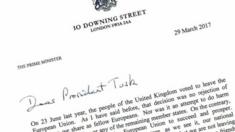
No comments:
Post a Comment